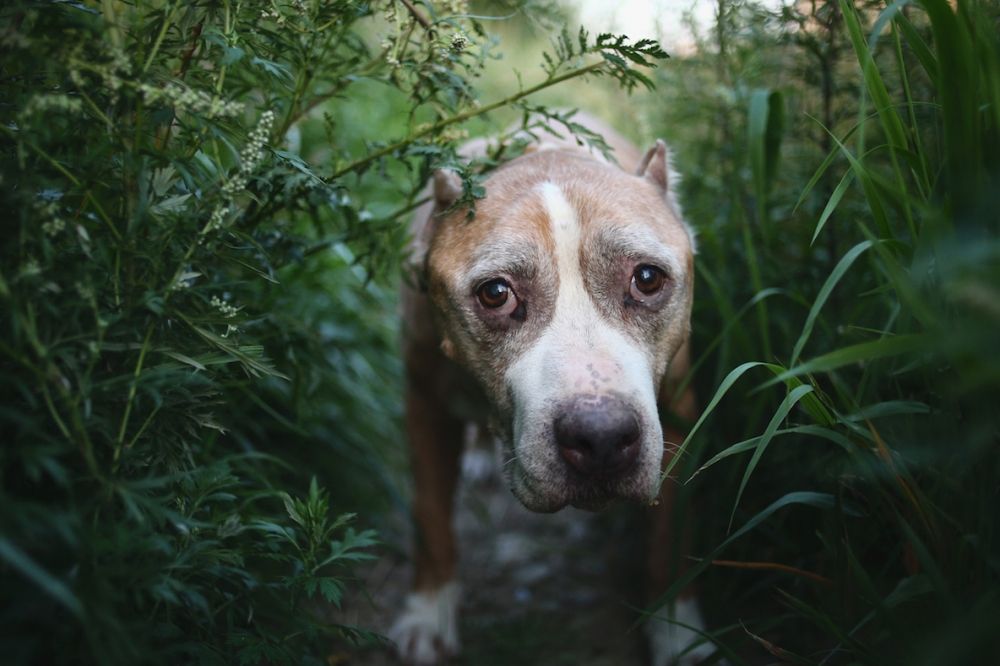- Dog CareDog LifeCommunity
- Photo Contest
Photo Contest- Giveaways
Should You Adopt a Dog Right Now?
Larissa Wohl, best known for her pet-parent and adoption segments on the Hallmark Channel’s morning show Home & Family and “Adoption Ever After” initiative, has become a go-to animal expert as a news anchor, field reporter, and journalist. To date, Larissa has helped more than 2,000 animals find their forever families and has become a voice for animals. Throughout her reporting, Larissa has uncovered a local animal dumping ground in Arizona, introduced the world to issues plaguing Central California shelters, and highlighted the importance of helping senior dogs in San Diego.
In the animal-rescue world, the big story she’s seeing right now is that amidst the Covid-19 pandemic, animals are flying out of shelters. People now have more time and don’t want to be alone while social distancing, spurring adoptions and fostering in numbers that some rescues and shelters are having a hard time keeping up with. This sounds like a good thing, but when the pandemic is over, Larissa has concerns about how stable these homes will be. Today we talked with Larissa to get her perspective on these COVID-19 adoptions.
Modern Dog: Lots of people have been celebrating the shelter emptying of adoptable dogs. On first glance I think this sounds like a great thing to a lot of people but are there concerns about the long-term stability of these placements?
Larissa: This is such a great question and thank you for asking! Unfortunately, as rescuers, we often hold our breath to make sure each adoption is going to stick 100% before we can truly celebrate. It's a sad truth, but many wonderful animals that are adopted get returned to rescues or shelters (days/weeks/months/years later) because the adopter made an impulsive decision, feels overwhelmed, or doesn't know how to handle an issue that arises.
So, to answer your question, while I am so excited and appreciative of all the wonderful people who stepped up to adopt right now, and I'm sure a large percentage of them will end in long-term adoptions, there is a concern that when some people's lives go back to "normal" and work picks up again, they will find their adopted animals less convenient and return them to the shelter/rescue or attempt to re-home them (which can be dangerous as well).
Modern Dog: Do you have advice for people who are feeling compelled to adopt a dog right now in terms of considering if they actually want a dog for life or just because they are lonely while social distancing?
Larissa: Absolutely! Adopting right now is a great idea if you're ready to take on the lifetime commitment. I'd highly advise against adopting if it's an impulsive decision you're solely making just to have a companion during this time of isolation. You really do have to think about the fact that this animal will rely on you for its entire life, so you can't just look at it as something to fill your time right NOW. If you're looking for something short term, I'd highly suggest you foster instead! It's such a rewarding experience for both you AND the animal! It's temporary, usually free of cost and helps the shelter or rescue understand who would make the best forever home for the animal!
If you're still unsure what to do, I would ask yourself a few crucial questions.
Adoption Readiness Checklist
#1 Do you have enough time for an animal (even when work picks up again)?
#2 Can you afford their food and general supplies?
#3 Can you afford their basic vet exams as well as emergency vet visits that may arise (and trust me…they do!)?
#4 If this animal develops a negative behaviour, are you willing to get a trainer?
#5 If you need to travel or you’re gone long hours every day, do you have someone in place to help or are you willing to hire someone?
If you feel you are in a position to take on this responsibility, I'll be the first one cheering you on! Adopting an animal is such a win-win situation. If you don't feel like you can take on all these responsibilities, you can still help animals in need by fostering, volunteering or donating!
Modern Dog: Are there ways that rescue groups and shelters can better screen potential adopters right now to determine if someone is ready to make a life-long commitment to an animal?
Larissa: I think it's extremely important that shelters and rescue groups ALWAYS screen potential adopters thoroughly. Unfortunately, it doesn't always happen due to lack of funding, resources, and manpower.
Government-run shelters aren't often allowed to do much screening, while non-profit rescue groups are. As an adopter, you will definitely notice a difference when adopting from a shelter versus a rescue group in terms of their requirements, fees, home visits, etc.
Currently, many rescue groups I work with are taking their adoption applications very seriously and are doing the best they can to make sure the adopter is in it for the long haul. That said, if an adopter changes their mind at some point down the road, the rescue organization is the best place for the animal to be returned to.
I think the best thing shelters and rescues can realistically do right now is to sit down with each potential adopter and get a true feel for what type of commitment the person/family is really looking for. My hope is that the employee can then steer the adopter in the right direction, whether it's adopting a dog/cat or fostering. I think it's VERY important that people walk into a shelter or rescue and leave with a positive experience. Whether that means they leave with an animal or feel educated enough to determine it's NOT the right decision for them, they feel like they were heard, respected, and helped. Shelters still carry the stigma of being "scary" and it can be the interaction a human has with an employee that makes all the difference.
Modern Dog: Can you talk a little bit about concerns you have around the large numbers of animals who are being fostered in homes during the Covid-19 pandemic and how you think that will impact rescue/shelter populations when this situation is over?
Larissa: To be honest, this is a situation I'm dreading because rescues and shelters are going to be completely overwhelmed if everyone returns their foster animals at once.
The biggest piece of advice I've been giving everyone is to be extremely honest and up front when fostering right now. Please let the shelter or rescue know your true time commitment so they can plan ahead. I foresee a grave situation where everyone fostering will suddenly return their animals back to the shelter/rescue at the same time and they will have to make life or death decisions.
In addition to that, many rescue organizations are solely foster-based. For example, you can only commit to three weeks as a foster and then they have to find someone else to take that animal afterwards. It's usually doable as long as they have the heads up to start their search. So please communicate with them about your schedule and be realistic.
In the meantime, this is a great time to work with your foster animal and set them up to be the best pet they can be for someone! Take advantage of this time and start doing some basic training (there are tons of videos online), network them to your friends and family by using online platforms, taking comical photos or videos and spreading the word!
That way, even if they aren't the forever pet for you, you may be able to help them find a forever home before this is even over and they won't ever have to go back to a shelter or rescue.
That said, whenever you're fostering, the adoptions HAVE to go through the agency the animal is with. You can't do the adoptions on your own, so always make sure to put a possible adopter in touch with the agency directly!
Modern Dog: Because most shelters are open for very limited, by-appointment-only adoptions, do you have thoughts for how people can determine if a potential dog is right for them when they might not have the same time and access to that dog because of Covid-19 restrictions?
Larissa: This is a tough situation and not an easy question to answer but I do think there are a few things you can do to help ensure a good match.
#1 Seek out shelters and rescues that are doing virtual adoptions and "meet and greets." This will give you the ability to watch the animals online and get a sense of their personality.
#2 Seek out animals that have been in a foster home, so you can get a better idea of how they're like in a home environment, with kids, animals, etc. This is the joy of fostering because it allows a future adopter to make a much more informed (and hopefully lasting) decision.
#3 Remember that adopting isn't always about you! You're signing up to help an animal in need and you don't always know everything about the animal and its personality! To me, that's all part of the adventure, but you have to be open and willing to understand that.
#4 Unfortunately the impact of COVID-19 is going to last a while. Even when social distancing is over, people who have been laid off or had a drastic drop in income will be surrendering their pets. So, if you want the ability to have more interaction with a potential pet, remember that there is always time. Once this immediate threat passes, we will be able to go back to shelters and interact. A new pet should never be an impulsive decision, so wait it out for a bit and then find your perfect furry family member in a few months.
#5 Instead of adopting, foster right now. It's a great way to get a feel for an animal and decide if it's the right one for you and your lifestyle! It still benefits the animal if you don't adopt it, just remember to be up front and honest with the agency you're working with and stick to the amount of time you offered to foster. It's still a commitment, just not one that lasts a lifetime.
Modern Dog: Any other thoughts about how to make these Covid-19 adoptions stick? Or any other thoughts about adoption/fostering dogs during Covid-19 pandemic?
Larissa: I think it's important to remember that your animals depend on you for safety and protection. There's still a lot of unknown about Covid-19 and I completely understand everyone's concerns, but please don't abandon or harm your animals. According to the experts, there's no evidence to date that domestic dogs and cats can spread Covid-19 to humans. Dogs and cats DO get certain types of coronavirus strains and always have, but they are species specific and not the same as Covid-19.
That said, always use common sense when dealing with your animals and stick to good hygiene practices. If you're fostering an animal, I suggest giving them a good bath immediately and using your own leash/collar if possible. That way, you can put your mind at ease about any germs entering your home!
I'd also urge you not to allow others to interact with your animals right now. This is just out of an abundance of caution to keep any respiratory droplets from someone getting onto your pet. Other than that, please remember that during these uncertain and scary times, our pets can bring us so much happiness, laughter, companionship and meaning to life. Please consider adopting or fostering today and feel free to reach out to me with any questions about the process. I can't always respond to everyone, but I try my best!
Lastly, if you're not in a position to adopt or foster, please remember that many shelters and rescues are seeing a huge drop in monetary and supply donations right now. As more and more people are being financially impacted by Covid-19, they're opting to not donate as much. So, if you are in a position to donate, please go online and seek out shelter or rescue "wish lists." Most of them are on their websites and you can donate directly through the internet (no contact necessary!)
______
Sassafras Lowrey is a Certified Trick Dog Instructor and author of “Tricks In The City,” “Healing/Heeling,” “Bedtime Stories For Rescue Dogs,” and the activity book “Chew This Journal” forthcoming in Summer 2020. Follow Sassafras and her canine adventures on Twitter/Instagram and at SassafrasLowrey.com
Dogs Surrendered as Misinformation Surrounds COVID-19
The global pandemic of COVID-19 has infected hundreds of thousands of people around the world and has caused thousands of deaths. However, it is not just humans who are impacted by the spread of the virus, but also pet dogs. It is not because the dogs are susceptible to the virus, or that there is any evidence that they can transmit it, but simply because people are afraid and they are acting irrationally out of panicky concerns for their health. There are reports from a number of animal rescue societies around the world that there has been an uptick in the number of pet dogs that are being surrendered to shelters, or simply abandoned, because people are fearful that their dog may carry, or pass on, the virus. The dogs that are impacted the most seem to be smaller breeds, such as those that might be found in the households of people who live in apartments or condominiums.
The current situation brings to mind another historical example in which animals were blamed for a pandemic, and this caused many thousands of animals to lose their lives. During the 14th century there was an eruption of Bubonic Plague, often referred to as the “Black Death.”The disease was caused by a bacterium that lives in the digestive tracts of fleas. The preferred host for these fleas was rats. Cats had already attracted suspicions from some groups in the Catholic Church for religious reasons. This was because felines are mostly active at night, are often independent, sometimes—like all animals—unpredictable, and, in the case of feral cats, don’t socialize well with people. To top it off, cats are frequently the companions of older, solitary women—who might (because of their gender and lifestyle) be witches, the thinking went. Thus it was an easy transition to the belief that cats might be agents of Satan, and might well be causing the plague. It was a scary time, and since there was no known cure, and little was known about how to avoid the disease, people found psychological comfort in finding something tangible to blame, and something to take action against.
"After thousands of tests, they reported on March 13, 2020 that they have seen no positive results in pets for the coronavirus strain responsible for the COVID-19 respiratory outbreak in humans."
Sadly, this hysteric and uninformed belief led to a vendetta against cats, and many cats were killed. But as the number of cats decreased, the number of rats increased, which contributed to the spread of the plague. Since killing the cats wasn't stopping the pandemic, the frightened population felt that co-conspirators must be involved, and hence dogs were also soon singled out, and many were exterminated. When that didn't stop the plague other suspects, such as Jews and gypsies, were sought out and killed as well. Eventually it was noticed that families who persisted in keeping cats actually had lower rates of infection, and slowly the fear of cats began to be reversed and their extermination ceased. An increased population of cats ultimately helped to curb the spread of the disease.
One might think that in our enlightened age in which we depend upon science, rather than simply fear and superstitious beliefs, we would not immediately blame our domestic animals for our human health problems. However, in February 2020, the Hong Kong Agriculture, Fisheries, and Conservation Department reported on a case of a pet dog testing “weak positive” to the COVID-19 virus. The dog was owned by a 60-year-old woman who had contracted the viral disease, but who ultimately recovered. The dog was quite elderly, a 17-year-old Pomeranian who was suffering from other underlying illnesses as well. The dog showed none of the overt symptoms of the disease, and after a two-week quarantine, which ended after two successive tests showed no evidence of the virus, the dog was released back to her owner.
Because of the fact that there was no evidence that the dog had actually developed antibodies to COVID-19, some experts have questioned whether there is enough evidence to say that the dog actually had contracted the disease. Several veterinary experts contended that the test used in Hong Kong would be unable to detect whether the dog had the virus or if it had simply licked contaminated surfaces in the home. Nonetheless, reports of this single case went viral and the panic associating dogs with the spread of this coronavirus went global.
What does the data actually say? Well the best evidence so far comes from IDEXX Reference Laboratories, which is a global network of more than 80 laboratories.IDEXX evaluated thousands of canine and feline specimens during validation of a new veterinary test system for the COVID-19 virus. The specimens used for test development and validation were obtained from specimens submitted to them for PCR testing (which looks for fragments of the specific RNA associated with the virus). After thousands of tests they reported on March 13, 2020, that they have seen no positive results in pets for the coronavirus strain responsible for the Covid-19 respiratory outbreak in humans.
Based on this evidence, and results from other sources, the Center for Disease Control (CDC), World Health Organization (WHO), American Veterinary Medical Association (AVMA), and the British Veterinary Association (BVA) have all concluded that the threat of transmission from dogs to humans is virtually nonexistent. Several representatives of these organizations have commented that the trend toward people abandoning their pets because of fear of the virus is unwarranted. In their most recent update on the matter (March 16, 2020) the AVMA notes that simple precautions are all that seem to be necessary. In the case where an individual in the household is infected, making sure that there is no sharing of towels, utensils or bedding between pets and the infected person (or other people in the home) should be sufficient.
Still, as in the case of the Black Plague, people find comfort and a means of allaying their own fears by finding a scapegoat, and pet dogs are a visible and easily accessed target. This is most obvious in China where a notice from city officials in Hongjiang, in Hunan Province, indicates that pets in public areas and unattended animals would be killed without exception. In another county, Zheniang, authorities warned that dogs which are found in public would be exterminated.
Faced with this panic around the globe, some dog owners are surrendering their dogs to shelters, while others quarantine their pets in the house, waiting for the time that the "all clear" maybe sounded. Meanwhile, a small new industry has appeared to supply tiny facemasks for dogs. All of this despite the assurances of the major medical, veterinary, and scientific agencies.
Dogify Your Inbox
Sign up for the FREE Modern Dog Magazine newsletter & get the best of Modern Dog delivered to your inbox.
"*" indicates required fields
By clicking the arrow, you agree to our web Terms of Use and Privacy & Cookie Policy. Easy unsubscribe links are provided in every email.



